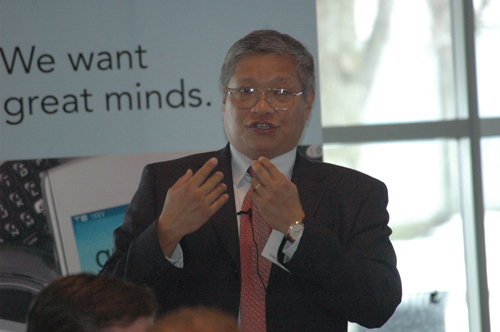
Fidelity Investments executive Ren Cheng has a warning for people who are making financial plans for retirement: It isn’t nearly as easy as it use to be, and it may only get tougher.
Cheng, a top administrator for the investment management arm of Fidelity, told a gathering of local financial service managers and students at Bryant University in Smithfield last week that two once-in-a-lifetime trends in the investment world have combined to set up a dangerous situation, or a profitable one, depending on how it’s handled by institutional and individual investors.
The trends: globalization of the economy – which is ratcheting up investment risks – and the steady demise of the defined-benefit pension plan – which is forcing people to make their own investment decisions with their nest egg.
“The market is getting more and more complicated and more and more risky just at a time when average investors are asked to take a more active role in their investments,” Cheng said.
Cheng’s keynote speech was part of the annual Financial Services Forum at Bryant sponsored by the student-operated Archway Investment Fund. The forum included a panel of several portfolio managers discussing the future of the financial services sector, including the growing impact of private equity firms and hedge funds.
Cheng, the chief investment officer in the Global Asset Allocation group for Fidelity Management and Research Co., said in his presentation that he is concerned that globalization, while offering opportunities, is also fraught with danger.
The world’s economies can be now classified as a “highly coupled system” in which local events can have wide-ranging effects on the entire world.
Case in point: the subprime meltdown. Even though Europe and Japan have very tight lending standards, Cheng said, foreign banks were sent reeling because they had purchased risky mortgage-backed securities that originated in the United States.
And with nations tied together financially, economic shockwaves can ripple across the world more easily, and more often.
“The so-called once-in-a-lifetime events have a tendency nowadays of popping up every three to five years,” Cheng said. “We’re in a highly coupled economy – extreme events for good or bad tend to happen with alarming frequency. And we better get ready for it.”
Add to that, confusion caused by more complicated investment vehicles available in recent years, such as mortgage-backed securities and collateralized bond obligations.
With the 401(k) plans and Individual Retirement Accounts taking the place of defined-benefit pension plans, are individual investors up to the task? Most aren’t, according to Cheng.
“The average investor is not doing the job,” he said. “Most people don’t want to watch the market every day.”
Human nature doesn’t help, either.
Cheng pointed to data that showed people tend to panic and pull their money out of the market during times of crisis, which means they’re not invested at times of recovery, when returns are the greatest. Such “herding instinct” can prove costly, he said.
There’s some good news: Cheng said he supported the somewhat controversial Pension Protection Act, signed by President George W. Bush in 2006. The act, among other things, allows for employers to automatically enroll workers in a tax-deferred retirement plan if they take no action themselves.
As a result, the popularity of target-date mutual funds has skyrocketed. The funds, which are now offered by most fund companies, automatically lower the amount of risk in the portfolio as it reaches a target retirement date; no input from the investor needed.
“Whether you like it or not, we have a highly coupled system and we better get use to it and figure out how to cope with this new situation,” Cheng said. “The consequences of not doing so could be very high.” •











